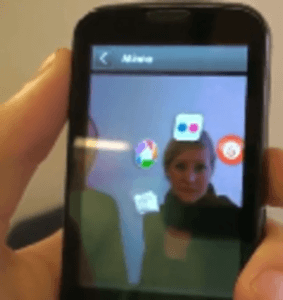Technology entrepreneur and Dallas Mavericks owner Mark Cuban has just invested in a video company that can identify how many people are in a specific location at a particular time. While currently the technology is used for analyzing “traffic patterns” and “security,” writes Cuban on a blog post announcing the deal, the next step is adding facial recognition software for the purpose of check-ins using location-based software, he says.

“Rather than someone checking into a specific application, we would already know you are there,” Cuban explains. That prospect is either incredible or downright scary, depending on how you feel about privacy.
Checking In: Still a Manual Process
For users of location-based services, particularly the so-called check-in applications like Foursquare, Gowalla, Brightkite, Loopt, MyTown, Latitude and others, the process of registering yourself as present at a given location is still very much a manual one. A user has to pull out their smartphone, launch an app, wait for it to load, then tap a button to check in. Hardly a social activity for what are branded “social networking services.”
Those who go through this process are often rewarded for doing so, with tips about the establishment from their friends, like the best entrée to order at a restaurant or which bartender makes the best martini. Sometimes location-based services users even get access to special discounts or coupons. For example, those who become “mayor” of their local Starbucks on Foursquare (a honorary title given to those who check in the most) get discounts on Frappuccinos. Those who check in to clothing store Ann Taylor get discounts on purchases, too. And those who check in using IZEA’s WeReward can actually earn cash back.

But for the mainstream user, the idea of checking in hasn’t caught on just yet, in part due to privacy concerns and also perhaps because they don’t realize the value of doing so. Only a handful of major chains and other big-name businesses are offering tangible rewards, so checking in because of a coupon or special is a decidedly hit-or-miss endeavor at this point.
Despite these potential pitfalls, location-based services are steadily growing. Loopt has 4 million users, Google’s Latitude 3 million, Booyah’s MyTown and Foursquare over 2 million and Gowalla 340,000. And those user counts are growing fast for some – Foursquare, for example, is adding on average 12,900 new users per day.
Background Check-ins Encourage “Serendipity”
One problem all the location-based companies are trying to address is a way to overcome the manual process involved with performing a check-in. For services like Loopt, the idea has been to take advantage of a smartphone’s ability to run processes in the background, a feature just added to the latest iPhone OS software, iOS 4. “The ability to run location-based apps in the background makes serendipity happen… Users will be able to share their location and receive alerts on the phone in their pocket when they’re near a friend,” said Sam Altman, CEO of Loopt, when the feature went live.

Although that makes the process easier, there are still questions to be answered: How long does background sharing remain on? Do you need to remind people on a regular basis that they’re sharing their movements? How often do you do so? Should this be switched on by default?
Passive Check-ins with your Face?
Now it seems check-ins may become even more passive than apps that run in the background if Cuban has his way. All you would have to do is walk into an establishment and your check-in would be registered – yes, via facial recognition software.
Hints of “Minority Report,” anyone? Indeed, such software could “see” you, check you in and then offer you personalized advertisements, much like those presented to Tom Cruise’s character in the futuristic movie where billboards and holograms knew who you were and what you purchased.
Will that be horrible or helpful, though? After all, recommendation systems on sites like Amazon.com and Netflix already help improve upon your shopping experiences, so why not location-based software?
However, even though such systems are likely to be opt-in, some will find this automated Big Brother type process far too invasive. And others think that it misses the point entirely. Dennis Mink, CEO of location-based aggregator FootFeed, says, “By sharing where you are, what you are doing and thoughts about the experience, it gives you a sense of being connected to the world. This is what motivates people to [use] Twitter, post a status on Facebook or check in at their current location… To think that a video system with facial recognition software can fill the emotional needs of millions of people is quite simply misguided.”
On the other hand, Aaron Strout, CMO of Powered, a dedicated social media agency, thinks the approach sounds “quite innovative,” but cautions that facial recognition technology may not be able to perform on this level for at least of couple of years.
The biggest question, though, is whether the mainstream will eventually come to accept such automated and personalized (albeit somewhat creepy) technology – or does it go one step too far in asking users to exchange privacy for rewards?

















